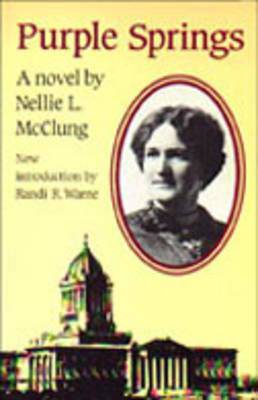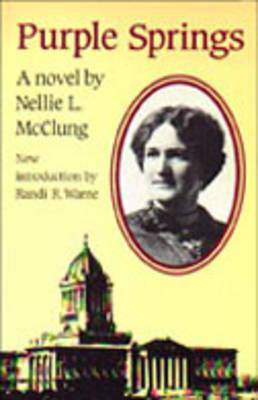
- Retrait gratuit dans votre magasin Club
- 7.000.000 titres dans notre catalogue
- Payer en toute sécurité
- Toujours un magasin près de chez vous
- Retrait gratuit dans votre magasin Club
- 7.000.000 titres dans notre catalogue
- Payer en toute sécurité
- Toujours un magasin près de chez vous
Description
The third of Nellie McClung's four novels, Purple Springs (1921) completes the story of Pearlie Watson, the oldest child of shanty Irish immigrants settled in southwest Manitboa. Peral - now a country schoolteacher - has learned that the pain and suffering of the world is ingrained in structures which are not easily or effectively swayed by 'the art of being kind.'
Purple Springs fictionally extends many of the arguments made by McClung in In Times Like These regarding 'male statecraft, ' graphically illustrating the consequences through her characters. McClung skilfully weaves together these social critiques in a tale of love, vocation, and coming-of-age, which sees Pearl, as a prototypical McClung, take on the corrupt Conservative government of Manitoba - and win. McClung's own triumph in the 'Women's Parliament' held in Winnipeg's Walker Theatre in 1914 is here dramatically and delightfully recreated with Pearl Watson as the premier, in a speech taken virtually verbatim from McClung's own.
Purple Springs explores an important piece of Canadian social history. It invites its readers to enter imaginatively an earlier age when women were second-class citizens in law as well as custom, and gives at least one woman's view of what needed to be done to right that injustice.
Originally published by Thomas Allen, 1921.
Spécifications
Parties prenantes
- Auteur(s) :
- Editeur:
Contenu
- Nombre de pages :
- 335
- Langue:
- Anglais
Caractéristiques
- EAN:
- 9780802068644
- Date de parution :
- 24-04-92
- Format:
- Livre broché
- Format numérique:
- Trade paperback (VS)
- Dimensions :
- 134 mm x 203 mm
- Poids :
- 30449 g







